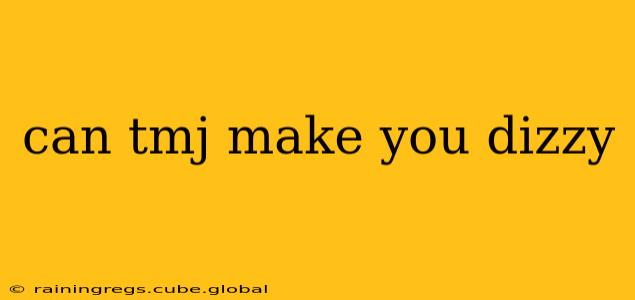Temporomandibular joint (TMJ) disorder, or TMJ, affects the jaw joint and surrounding muscles, causing a range of symptoms. While jaw pain and clicking are common, many people wonder: can TMJ make you dizzy? The answer is a complex "yes," but understanding the connection requires exploring the intricate relationship between the jaw, the inner ear, and the nervous system.
This article delves into the potential link between TMJ and dizziness, exploring various contributing factors and offering insights into diagnosis and management. We'll also address frequently asked questions surrounding this often-overlooked symptom of TMJ.
How Can TMJ Cause Dizziness?
The connection between TMJ and dizziness isn't always straightforward. It's not a direct cause-and-effect relationship in most cases, but rather a complex interplay of factors. Here are some key mechanisms:
-
Cranial Nerves: The trigeminal nerve, responsible for sensation in the face and jaw, runs close to other cranial nerves that control balance and eye movement. TMJ problems can irritate or compress these nerves, leading to dizziness, vertigo, or imbalance. This irritation can disrupt the signals sent to the brain, impacting spatial orientation.
-
Muscle Tension and Posture: Chronic TMJ often involves significant muscle tension in the jaw, neck, and shoulders. This tension can affect posture, leading to imbalances that contribute to dizziness. Poor posture strains the neck muscles, altering blood flow to the brain and possibly triggering dizziness.
-
Inner Ear Involvement: While less common, some studies suggest a possible connection between TMJ and the inner ear. The intricate network of muscles and nerves in the head and neck could indirectly influence the vestibular system (responsible for balance) within the inner ear.
-
Stress and Anxiety: TMJ is often associated with stress and anxiety. These factors can exacerbate symptoms, including dizziness, even independent of direct TMJ-related nerve irritation. The body's stress response can affect blood flow and other physiological factors contributing to dizziness.
What Other Symptoms Might Accompany TMJ Dizziness?
Dizziness isn't always the only symptom when TMJ is involved. Other symptoms can include:
- Jaw pain: Aching, sharp pain, or tenderness in the jaw joint.
- Headaches: Often tension headaches or migraines.
- Earaches: Pain or fullness in the ear(s).
- Neck pain: Stiffness and pain in the neck and shoulders.
- Facial pain: Pain in the face, including the temples and cheeks.
- Difficulty chewing: Pain or difficulty opening or closing the mouth.
- Clicking or popping in the jaw: Sounds when opening or closing the mouth.
- Limited jaw movement: Restricted range of motion in the jaw.
How is TMJ-Related Dizziness Diagnosed?
Diagnosing TMJ-related dizziness requires a thorough examination by a healthcare professional. This may involve:
- Physical examination: Checking jaw range of motion, palpating for muscle tenderness, and assessing posture.
- Neurological examination: Testing reflexes, balance, and coordination to rule out other neurological issues.
- Imaging studies: X-rays, CT scans, or MRIs may be used to visualize the jaw joint and rule out other causes of dizziness.
- Vestibular testing: Tests to assess the function of the inner ear, if necessary.
Can TMJ Dizziness Be Treated?
Treatment for TMJ-related dizziness focuses on managing both the TMJ disorder and the dizziness itself. Treatment options might include:
- Physical therapy: Exercises to improve jaw range of motion, strengthen muscles, and improve posture.
- Pain management: Over-the-counter pain relievers, prescription medications, or other pain management strategies.
- Dental appliances: Mouthguards or splints to stabilize the jaw joint.
- Stress management techniques: Relaxation exercises, meditation, or counseling.
- Medications: In some cases, muscle relaxants or other medications might be prescribed to alleviate symptoms.
What if My Dizziness Isn't Related to TMJ?
It's crucial to understand that dizziness can have many causes, and TMJ is only one potential factor. Other conditions that can cause dizziness include:
- Inner ear infections: These can disrupt balance and cause vertigo.
- Meniere's disease: A disorder affecting the inner ear.
- Benign paroxysmal positional vertigo (BPPV): A common cause of vertigo triggered by head movements.
- Migraines: Can cause dizziness as a symptom.
- Neck problems: Cervicogenic dizziness originates from the neck.
Is TMJ Dizziness Permanent?
The prognosis for TMJ-related dizziness varies greatly depending on the underlying cause and severity. With appropriate treatment and management, many people can experience significant improvement or even resolution of their symptoms. However, in some cases, dizziness may persist, especially if the underlying TMJ disorder isn't effectively treated.
This information is for general knowledge and does not constitute medical advice. Always consult a healthcare professional for diagnosis and treatment of any medical condition, including TMJ and dizziness.
